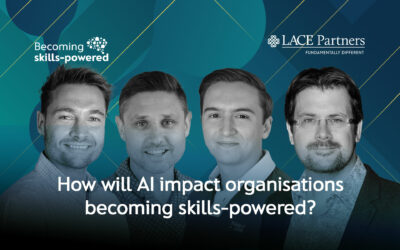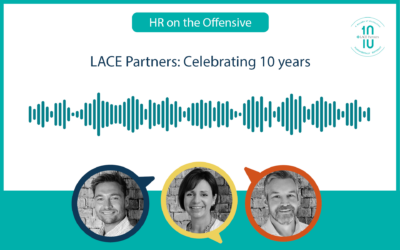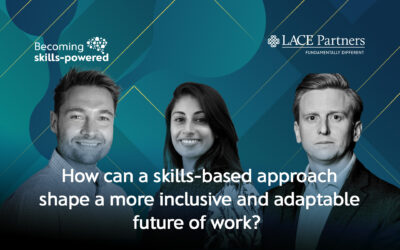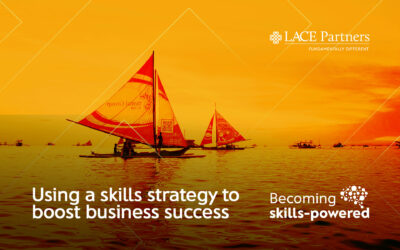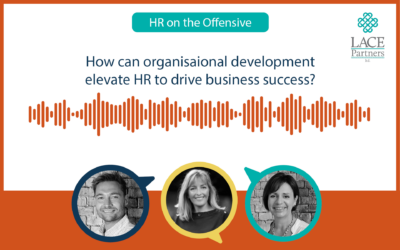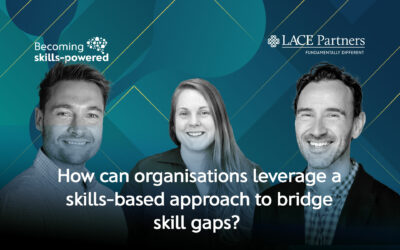Mental health has never been so high on the workplace agenda, but here’s a slightly different question to consider… How healthy is your organisational brain? LACE Partners Founder Aaron Alburey and Steve Carter, Senior Partner at Apter Development, investigate.
Your organisation houses a wealth of wisdom. But that wisdom is only useful if you’re able to harness it and make it work towards a collective purpose. It’s vital to understand the unique knowledge and experience each of your employees hold and find a way to connect this information, so everyone in your organisation can benefit from it.
In short, you must supercharge your business’s brain. Get it right, and you’ll likely witness everything from increased sales performance to improved customer satisfaction and greater employee engagement.
This is one brain teaser that demands to be solved.
Organisational brains are a lot like human brains
Let’s start with some basic biology – the human brain is a network of experience and knowledge, connected by synapses, chemical enablers and inhibitors. If we run with this definition, organisations also contain a brain – made up of their people’s collective knowledge and experience.
Like the human brain, an organisational brain has connections. These connections can be unclear, underused and inhibited. Nick Petrie, Centre for Creative Leadership, argues that the more VUCA (Volatile, Uncertain, Complex, and Ambiguous) an environment, the more it requires higher levels of complex, adaptive thinking. A fast and furious environment like today’s marketplace demands a bigger, smarter brain. One capable of handling the chaos.
Businesses benefit from neuroplasticity
The human brain can rewire itself to echo the positive behaviours a person witnesses in others. This is called neuroplasticity. Changes occur in our neuron pathways and synapses, as a result of changes in our behaviour, environment, neural processes, thinking and emotions.
Like the human brain, the organisation brain is constantly moving connections around, assigning their roles and altering their purposes. A healthy organisation should excel at this level of plasticity.
But, all too often, this opportunity for generative flexibility is missed. Things go wrong when we only understand a fraction of what each person can do, and when we fail to see where to move them to unlock their true potential.
Poor understanding and collaboration are inhibitors
Here’s something that makes this process even trickier: us humans have an innate inability to understand people above and beyond the last experience we had of them. The psychologist Herbert Ebbinghaus famously defined this aspect of humanity in his “recency theory”.
If we’re more inclined to remember our colleagues through the lens of our most recent experience of them and are unable to perceive the larger sum of their experience, we’re missing out. It’s no wonder McKinsey and Harvard have independently concluded that improved collaboration (thinking together and/or deciding together) could drive 20-25% productivity gains. Unleashing the power of collaboration is one of the most important challenges facing today’s organisations.
Get your brain in good shape
So how can you optimise your organisational brain? In this instance, ‘drink more water’ won’t get you very far. Instead, we suggest you begin with the three Cs: Collect, Connect, and Create.
Collect
First, you need to collect the wisdom that’s out there in your organisation. Not just ‘facts’, but insight, expertise, experience, practice, innovation, motivation, engagement and more.
Connect
Next up, connect the ‘wisdom holders’ to each other. Get people talking, collaborating and sharing.
Create
Once you’ve collected what your organisation knows and joined people together, you can create unique and powerful solutions – ones fuelled by knowledge sharing, mutual understanding and collaboration.
Keep your brain healthy
In most modern organisations, the process we’ve outlined takes place digitally. And there’s serious margin for error. Some data is captured when an individual is hired, but most of it is lost soon after. Information is split from the very first moment a candidate is contacted – LinkedIn messages commonly go unrecorded, for example. Internal record keeping falls short. CVs are often thrown away, along with interview notes.
Performance management discussions and development plans are rich data sources that are not effectively catalogued and indexed. Not only does a large percentage of information go missing, what is retained is commonly difficult to access. These pitfalls are opportunities, though. All the above, along with timesheets, payroll, calendars and even email are all valuable digital opportunities to capture important information and strengthen your organisation’s brain.
Don’t go it alone
There are tools out there to help you rise to the challenge, too. ProFinda, for example, enables you to codify knowledge in order to drive talent matching and expertise exchange. WhoKnows gathers valuable insight from your staff’s internet activity and Everwise collects and curates insight to match mentors and mentees.
Many of the best minds are arguing that the future of leadership will be defined by our capacity to learn. If this is the case, then start-ups on a mission to facilitate and nurture organisational wisdom are onto a winner.
What are you doing to get your organisational brain fighting fit?
Aaron Alburey FCIPD, Member of the HR Guild, father to the L, A, C, and E (Lauren, Alex, Caleb and Eve) in LACE Partners, and bouldering enthusiast.
Steve Carter, Senior Partner at Apter Development.

